
An Update on Attention to Racism and Counter-Messaging in 2025
The Collaborative on Media and Messaging (COMM) for Health and Social Policy has previously identified evidence for robust and growing counter-messaging and news attention to policies and initiatives designed to combat structural racism and health equity.

Those most willing to address health disparities tend to be overlooked
By Tom Fleischman, Cornell Chronicle
During the pandemic, the Centers for Disease Control and Prevention (CDC) reported that people from historically marginalized racial and ethnic groups were more likely than non-Hispanic white people to be infected, be hospitalized and die from SARS-CoV-2, the virus that causes COVID-19.
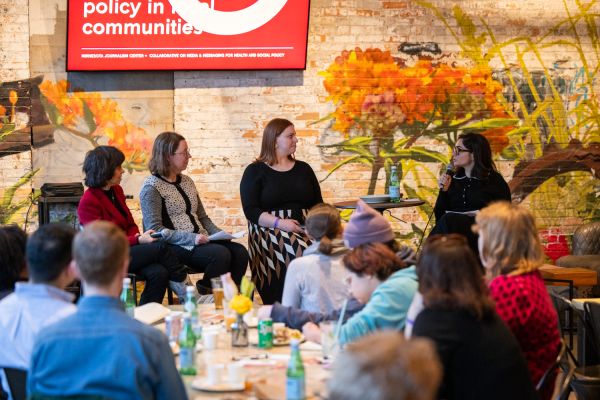
Strengthening Local Journalism’s Role in Public Health: Key Takeaways from Our March 5 Panel
On a cold, snowy evening in Minneapolis, a dedicated crowd gathered at The Market at Malcolm Yards for a vital conversation: How can local journalism better serve public health? Despite the winter weather, the warmth of engaged discussion filled the room as journalists, public health professionals, and community members came together to explore the challenges and opportunities in health reporting.

How to craft effective policy messages to advance equity
By Laura Reiley, Cornell Chronicle
In our politically charged climate, advocates have often raised concerns that messages describing racial disparities in social outcomes can reduce or polarize support for public policies to address inequality.

2024 Campaign Advertising Highlights: What Was and Wasn’t Featured in Issue Discussion on Television
And its implications for future policy to promote population health
2024 was another record-breaking year of campaign spending, with campaigns reaching citizens through their television screens, mobile devices, online, in their mailboxes and via social media platforms in an effort to convey their policy achievements and future priorities and their opponent’s policies and priorities.
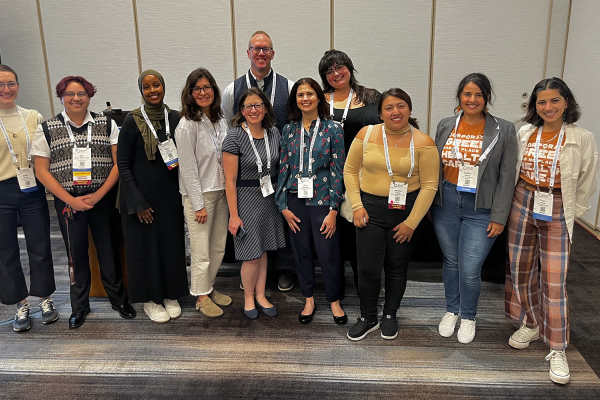
APHA Conference 2024 Recap: Strengthening Health Equity Through Collaboration and Storytelling
What a fantastic time we had at the APHA Conference in Minneapolis! Our week was filled with opportunities to connect, collaborate, and learn as we joined public health professionals from across the nation to explore pressing public health topics. Our team was excited to bring insights from our latest research, and it was even more inspiring to see the synergy created by each presentation, discussion, and exchange of ideas.
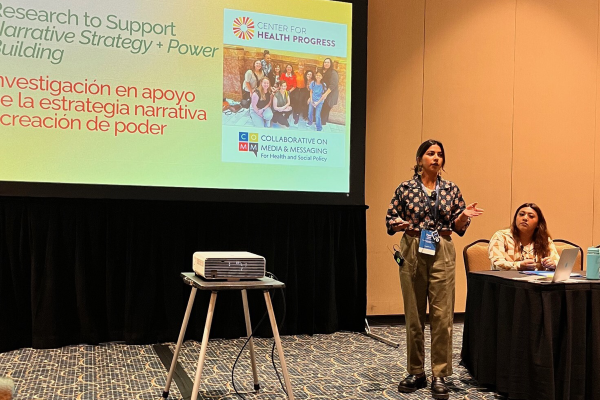
On the Road to Share Our Community-Engaged Research on Narrative Power
Since 2022, the COMM HSP team based at the University of Minnesota has been collaborating with Center for Health Progress (CHP) on an innovative community-based research partnership.

The Collaborative Launches into a New Year of Research and Connection
In mid-August, the Collaborative on Media & Messaging for Health and Social Policy team gathered for a full team meeting, hosted at Wesleyan University. This gathering provided a valuable opportunity to connect in person, brainstorm ideas, and set the stage for the work we’ll be undertaking this year.

New Report Outlines a Communicator-Centered Research Agenda on Health Equity Communication
One of the key principles of community-engaged research is to involve communities in the process of asking research questions. Doing so enables the research to be more useful and practical in the real world, and also advances equity principles in the conduct of research by putting the affected communities closer to the center of the research process.

Tips for Communicating About Health Disparities
In a recent study published in Social Science & Medicine, Jiawei Liu and Jeff Niederdeppe examined studies about social comparison framing of health disparities.

How Political Candidates Discussed Racial and Gender Identity in 2022 – and What it Means for 2024
The political discourse surrounding identity is particularly heated in early 2024, as the United States lurches toward another momentous election. Between news coverage of ongoing political attacks on college campuses and corporate diversity, equity, and inclusion issues; persistent attention to the roles of antisemitism and Islamophobia inflaming domestic tensions surrounding the Middle East war; and the continued repercussions of abortion restrictions across states, issues of identity loom large. And, these issues–and how the political candidates position themselves in this context–will likely shape voters’ decisions in the ballot box this fall.

Partisan Differences in Perceptions of Health Disparities in COVID-19
It is now abundantly clear that Republicans and Democrats have divergent views about COVID-19 – as evidenced by partisan gaps in attitudes, beliefs, and even behaviors, like wearing masks or getting a vaccine. Research has also demonstrated that people perceive the concept of health equity through the lens of partisanship. In a new study published as part of a special issue about health policy and polarization in the Journal of Health Politics, Policy and Law, members of our COMM team presented 2023 survey data on public perceptions of health equity issues and discussed the implications of these findings for the future politics of public health.

Comparing Cancer Risks and Screening Rates between Racial Groups in Public Health Messages May Have Unintended Consequences
In a recent study published in Human Communication Research, Jiawei Liu and Jeff Niederdeppe examined the effects of public health messages that feature cancer risk comparisons and screening rate comparisons between Black Americans and White Americans.

Kicking off Another Year of Collaborative Research with Intention and Connection
The Collaborative on Media & Messaging for Health and Social Policy team gathered for a full team retreat in August, hosted at the University of Minnesota in Minneapolis.

What Role Did Local News Play in the Controversy About Masks?
The Covid-19 pandemic posed a particularly difficult challenge for public health communicators because the information environment was rife with partisan cues and messaging that often contradicted or challenged the authority of scientific experts. The media played an ambiguous role in this regard: On the one hand, it served as a conduit for scientific advice to the public, on the other, it had the potential to disseminate and amplify misinformation.

News About Food Assistance During the COVID Pandemic Decreased Stigma but Overlooked Racial Inequities, Study Finds
Our COMM team had the opportunity to collaborate with the Berkeley Media Studies Group on an analysis of print and TV broadcast news stories about hunger and food assistance aired in 2021. This blog post was originally published on the BMSG website and examines how equity appeared in news about food assistance from 2021.

Local TV News Coverage of Early Care and Education: Stories About Scandals and (Sometimes) Policy
In April, President Biden signed an executive order that directed federal agencies to seek solutions to the persistent problems of early care and education (ECE) access and lack of affordability. (ECE encompasses the settings where young children receive care from someone other than a family member or their primary caregiver.)

Public Attitudes about the End of the Public Health Emergency: Framing the Consequences
On May 11, the national Public Health Emergency (PHE) declaration by the federal government will end. While this event has major public health implications, broader media and public attention to the event has been limited, likely because at least half of Americans earlier this spring reported that they believed that the pandemic was already over.

The News About Hunger Revealed Increased Support for Government Assistance During COVID. Will It Stay That Way?
Our COMM team had the opportunity to collaborate with the Berkeley Media Studies Group on an analysis of print and TV broadcast news stories about hunger and food assistance aired in 2021. This blog post was originally published on the BMSG website and offers reflections about the implications of the findings for advocates at the end of the COVID public health emergency.

Racial Equity Messaging Must be More Inclusive
By Tom Fleischman, Cornell Chronicle
In a review of more than three decades’ worth of studies that examine support for, or opposition to, policies with racial equity implications, a Cornell-led research group found that more research on messaging that includes the voices of historically marginalized people is necessary in the push toward equity.

2022 Campaign Advertising Highlights: What Was and Wasn’t Featured in Issue Discussion on Television
And its implications for policy to promote population health
Campaign advertising – on television, online, through social media platforms, and even at the gas pump – remains a centrally important method through which candidates for office (and the groups that support them) convey to voters their policy accomplishments and priorities and those of their opponents.

2022 Campaign Advertising Highlights: Understanding Themes in Limited Messaging on Climate Change and Critical Race Theory
By Steven Moore
Democrats and Republicans do not agree on much when it comes to politics. However, there does seem to be agreement from members of both parties that the country is on the wrong track, with a slim and broad majority of Democrats and Republicans, respectively, endorsing this idea.

2022 Campaign Advertising Highlights: Child Tax Credit References Largely Absent in Ads
By Erika Franklin Fowler, Natália de Paula Moreira, and Jielu Yao
As the 2022 midterm elections race to their conclusion on Tuesday, there has been a lot of discussion about the content and issue focus of the ads flooding the airwaves, with abortion topping the list for Democrats while Republican messaging has closed with an emphasis on government spending, inflation, and economic concerns about cost of living.
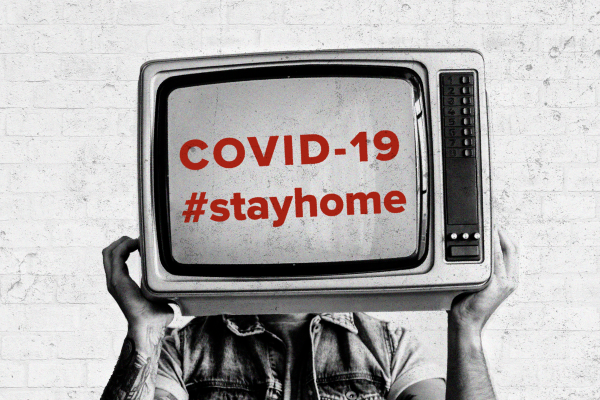
COVID-19 PSAs on TV in 2020 were Associated with the Political Orientation of Communities in which they Aired
Since early in the pandemic, Republicans and Democrats have exhibited different attitudes, beliefs, and behaviors toward the COVID-19 pandemic. These beliefs have even translated into divergent mortality, with a study released last week showing that after vaccinations became widely available, Republicans had higher death rates than Democrats.
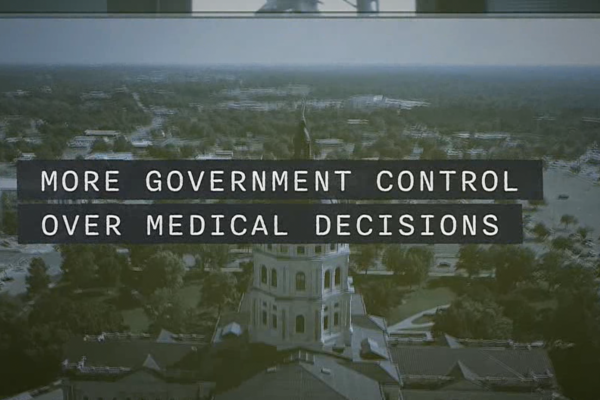
2022 Campaign Advertising Highlights: References to Abortion in Ads Reveals Anti-Government Messaging on Both Sides
Such a strategy has broader implications for public health
In the wake of the Dobbs Supreme Court decision overturning Roe v. Wade abortion rights, messaging in political campaign ads for the 2022 midterm elections has featured abortion prominently, especially in pro-Democratic messaging.
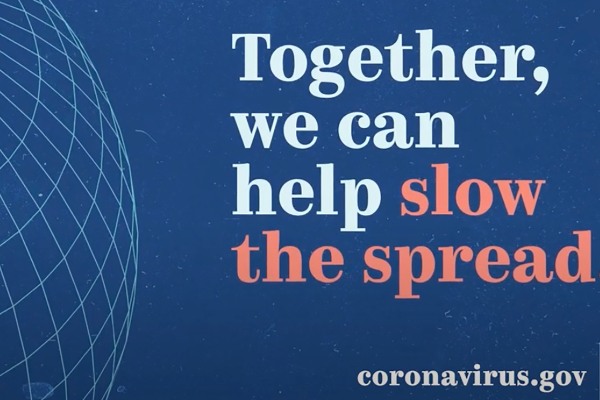
Federally-affiliated Public Service Announcements (PSAs) During the Early Period of the COVID-19 Pandemic
Our team, led by Margaret Tait, recently published the results of a study exploring public service announcements (PSAs) sponsored by the federal government and airing on TV during the early months of the pandemic, from March through December of 2020. The study is available open access in Preventive Medicine Reports.

Rapid Response Media Research will Promote Equity
By Jim Hanchett, Cornell Jeb E. Brooks School of Public Policy
Citing the urgent need for more effective and equitable health communication, three universities are collaborating on a unique research endeavor that will quickly identify developing public health issues, address conflicting messages and counter misinformation, funded with a newly announced $5 million grant from the Robert Wood Johnson Foundation.

Local TV News Coverage of Racial Disparities in COVID-19 During the First Wave of the Pandemic
Our team recently published the results of a study exploring local TV news coverage of racial disparities in COVID-19 during the first wave of the pandemic in Race and Social Problems (https://doi.org/10.1007/s12552-022-09372-5). This study examined how local TV news stories attributed causes and solutions for COVID-19-related racial health and social disparities, and whether coverage of such disparities changed after George Floyd’s murder.
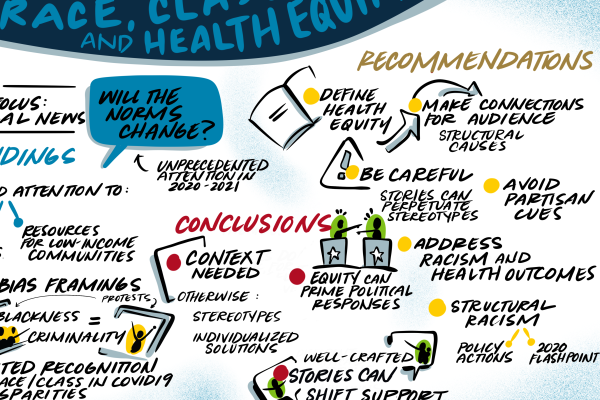
COMM Team Leads Web Convenings to Connect Research to Journalists and Practitioners, Identify New Research Priorities
On December 2 and December 10, 2021, our team convened audiences of journalists, communication professionals, researchers and advocates to learn about and discuss research findings. On December 2, the team led a discussion on Storytelling and the Social Safety Net, while the session on December 10 focused on Communicating about Race, Class, and Health Equity.

Cumulative Exposure to Political Campaign Ads about Crime Increases Crime Worry among Republicans
In a recently published study in The International Journal of Press/Politics, our team of researchers, led by Jiawei Liu, examined the content of political campaign ads about crime during the 2016 U.S. election cycle, and the consequences of cumulative exposure to political campaign ads about crime on crime worry.

Narrative Approach Can Change Minds on Child Care Spending
By Tom Fleischman
How do you capture hearts and minds when it comes to increasing public support for policies and programs related to early childhood education?
According to new multi-institution research led by Jeff Niederdeppe, professor in the Department of Communication in the College of Agriculture and Life Sciences at Cornell University, that all depends on whose hearts and minds are in the audience.

New Study on Paid Family Leave on Local Television News in the U.S.
Our team, led by Margaret Tait, recently published the results of a study exploring local television news coverage related to paid family leave policy in SSM-Population Health. A team of trained coders conducted a content analysis of relevant local news stories airing in 2018 and 2019 on the four major networks (ABC, NBC, CBS, and FOX) in all 210 media markets in the U.S.

Synthesizing Knowledge and Gaps in Research to Inform Communication Strategies in Building a Culture of Health
On January 15, 2020, the COMM HSP team convened an invitation-only research workshop called “Synthesizing Knowledge and Gaps in Research to Inform Communication Strategies in Building a Culture of Health”, held at Wesleyan University in Middletown, Connecticut.